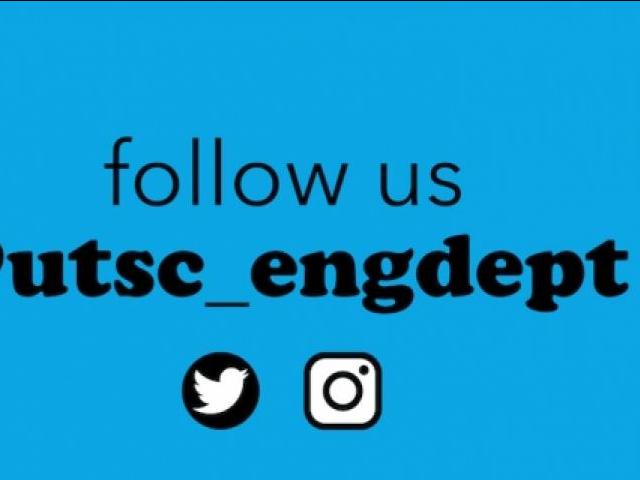The University of Toronto and the UTSC campus have an enormous wealth of resources at your disposal. We cannot include all of them here, but we would like to point you to a few that may be particularly useful, including general campus resources, as well as internet and print resources.
We also encourage you to peruse our general introductory packet, which is available by clicking the link below (you can also option+click or ctrl+click to download your own copy).
"Introduction to English at UTSC" Info Packet
General Resources:
CTL Writing Support, a.k.a. The Writing CentreLocation: AC 210 Website: http://www.utsc.utoronto.ca/twc/ The Writing Centre is a multifaceted resource for helping you craft any and all writing assignments, from understanding the assignment instructions to appropriate researching (and avoiding plagiarism) to writing techniques to reviewing and revising for submission to understanding your prof’s feedback and figuring out how to improve. The Writing Centre is best used ahead of time — don’t wait until the last minute to book your appointment. |
The English Language Development CentreLocation: AC 310 Website: http://www.utsc.utoronto.ca/eld/ The ELDC offers support of all kinds for any students who are looking to improve their use of English at the university level, and their services are not meant only for non-native speakers — even if you are fluent in English, you might benefit from the programs and resources offered by the ELDC. In particular, you may be interested in using their Academic English Health Check, a quick computer-based assessment of your language skills: https://utsc.utoronto.ca/eld/academic-english-health-check-aehc |
The UTSC Library (Bladen)Website: http://utsc.library.utoronto.ca English Liaison Librarian: Chad Crichton (ccrichton@utsc.utoronto.ca) The library is where you go for books, obviously, but perhaps less obviously it is a resource you can access for help and advice of all kinds, from researching to technology to course-specific research guides to group study rooms. |
AccessAbility ServicesLocation: SW 302 Website: http://www.utsc.utoronto.ca/~ability/ The mandate of UTSC’s AccesAbility is to provide support and accommodations for students with disabilities (whether physical, sensory, learning, or mental health) and other medical conditions. |
Health and Wellness CentreLocation: SL 270 Website: http://www.utsc.utoronto.ca/hwc/ You can find help, guidance, and resources of all different kinds at the Health & Wellness Centre. Their mission is to help our campus and our community feel better and be better. You can also reach out to our department's own Embedded Counsellor, Leah Erlich. Click here for details. |
Off-Campus Mental Health ResourcesOther than campus resoureces like UTSC's Health and Wellness Centre and the English Department's Embedded Counsellor, there are other local resources to help you manage your mental health. Mental Health and Emergency Counselling
Gerstein Crisis Centre ConnexOntario |
Sexual Violence Education/Prevention TrainingUofT is providing online training modules for education about, resources on, and prevention of sexual violence. The module is available through Portal. Exact information on how to access it can be found here: http://www.provost.utoronto.ca/committees/Working_Groups/SVactionplan.htm |
Internet and Print Resources:
For help in researching and writing your assignments (e.g., bibliographies, proposals, lit reviews, and essays), our Liaison Librarian, Chad Crichton, has set up a Research Guide specifically for English courses that you might find a good jumping-off place: http://guides.library.utoronto.ca/utsc_english
Courses in the English department use MLA conventions for citation and essay format. The current MLA Handbook will be a valuable resource throughout your degree, and we recommend either purchasing a copy of the Handbook or getting familiar with its location in the UofT Library: http://go.utlib.ca/cat/ 10277098
The standard and best dictionary for working in English literature is the Oxford English Dictionary (OED), which can be accessed directly whenever you are on a UofT network at www.oed.com, or can be accessed through the library website when off-campus: http://go.utlib.ca/cat/8323833
Oxford Reference is a searchable digitized collection of scholarly reference works in a wide range of subjects, for when you need a definition or explanation of a period, term, theory, or author (among many other options). As with the OED, it can be accessed directly from a UofT network (www.oxfordreference.com) or through the library website when off-campus: http://go.utlib.ca/cat/ 9873644
Two of the most common databases for scholarly journal articles in English literature are:
- MLA International Bibliography: http://go.utlib.ca/cat/7911838
- JSTOR: http://go.utlib.ca/cat/7911781
Plagiarism — which is representing the ideas and words of someone else as your own — is a serious offense in any English course. We strongly recommend that you familiarize yourself with the concerns of Academic Integrity as expressed in UofT’s Code of Behaviour on Academic Matters, and that you fortify yourself with strategies for understanding, recognizing, and avoiding plagiarism before you find yourself in a precarious position. There are many resources for learning the skills that will help you avoid any problems with Academic Integrity, including everything from proper citation to effective time management.
- University of Toronto’s Academic Integrity guide: http://academicintegrity.utoronto.ca
- Writing Advice: How Not to Plagiarize: http://advice.writing.utoronto.ca/using-sources/hownot-to-plagiarize/
- Citing Sources and Creating a Bibliography: http://guides.library.utoronto.ca/citing
The Writing Centre, the UTSC Library, and your professors will all have tips and tricks for effective researching — remember that you don’t have to go it alone, and that the sooner you seek help and advice, the better it will serve you.

